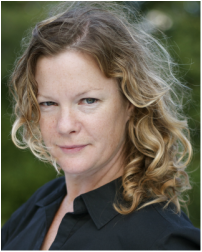 Chris Caswell
Chris Caswell I'm playing Aphra Behn. She was the first professional female playwright. She was also a spy, a libertine, and according to an early biographer and friend (who identifies herself only as "One of the Fair Sex"),
"She [Aphra] was of generous and open temper, something passionate, very serviceable to her friends in all that was in her power; and could sooner forgive an injury than do one. She had wit, honour, good humour, and judgment. She was mistress of all the pleasing arts of conversation, but used 'em not to any but those who love plain-dealing. She was a woman of sense, and by consequence a lover of pleasure."
Is there anything about your character that you can relate to?
Yes. When I first read the play, I was puzzled by Liz Duffy Adams' note about time. She writes, "The play is set in the Restoration period, but plays off the echos between the late 1660s, the late 1960s, and the present." I kept thinking, OK, I get why the Restoration would be compared to the 1960s, but why to now? Then I read an interview with Adams for Women's Project Theater (http://wptheater.org/wps-interview-with-playwright-liz-duffy-adams/) in which she says,
"I wrote Or, before President Obama was elected (during the primaries, actually). But I think I wrote it out of the same hopeful longing that millions were feeling, that helped elect him; hope does echo at this moment in history. I was tired of writing out of the anger, outrage and grief that the last few years brought us. I was dreaming of a new era: rational, enlightened, expansive. I was thinking about the cyclical nature of history, and wondering if the wheel was going to turn again."
And I understood. My own journal entry on the day we elected Obama was unabashedly hopeful -- a sort of general reflection on possibility. I don’t mean to make this political or to alienate anyone. It doesn’t have to be about Obama necessarily, or Kennedy, or Charles II. But it is about sharing a symbolic moment in history where society seems to shift overnight, and you suddenly feel liberated both personally and collectively.
I love that this play takes the risk in this cynical world to be optimistic. And I strive to shed my own skepticism enough to play Aphra Behn hopefully.
Is there anything about playing this role that intimidates you? Why?
There is so much about playing this role that intimidates me, but I’m going to answer this lightly with a confession. I'd rather play the comic relief character than the straight man. It's not that I like comic characters better necessarily; it's just that I have a lot of trouble not laughing when a fellow actor is being hilarious. It's really, really difficult for me to look someone in the eye who is doing something brilliantly silly and ridiculous and pretend to be anything but tickled by what they're doing. Such is the case many times over in this play. Aphra may be stunned or incredulous or annoyed by these characters, but Chris just wants to burst out laughing and hug them. Please wish me luck!
What would you like the audience to be thinking about after the show?
Well, there's a lot of kissing in the show. So, in addition to all the heady conversation we hope OR, will raise (e.g. Why isn't Aphra Behn or Nell Gwynne a household name? Is freedom only possible under an enlightened leader? How does the structure of the plot support the theme?), I think audiences may also be wondering how many breath mints and sticks of lip balm we've gone through.
Why should someone come to see this show?
Because it's a whole lot fun! Whether you're looking for crazy characters, or action, or sex, or love, or laughs, or intrigue, or a real darkness based on the circumstances of the day, or a fast-paced, madcap show, you shall have it! (And, my personal favorite: it’s written by a woman, directed by a woman, and about amazing women.)



